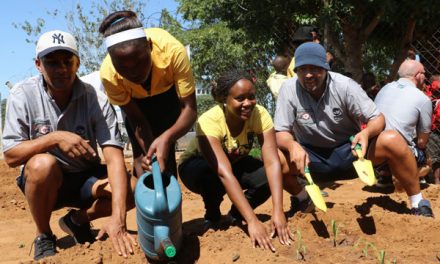
Intensive training turns communal game guards into special wildlife rangers

As the stakes in the war against poaching escalate at community level, a new breed of game guards has to be ready to counter any offensive and in some cases even deal with poachers in what amounts to quasi-military tactics.
During last year’s winter, a contingent of 24 communal game guards received their first basic training at Eagle Rock in the Khomas Hochland. This August, eleven of that first group of guards, completed a more intensive 4-week course in the Dzoti Conservancy in the Zambezi region.
Conducted by seasoned instructors, Chris Oosthuizen and Koos Moorcroft, the training shaped the guards’ ability to operate independently in close-knit two-man teams, gather intelligence from local sources, and operate unobtrusively in areas where poaching is suspected.
The training was sponsored and supported by the Namibian Professional Hunting Association through its subsidiary, the Hunters United Against Poaching (HUAP) Trust.

HUAP not only paid for the training of the special wildlife rangers, it also fitted every trainee with a full survival kit to be able to remain on patrol for extended periods. “We train the game guards how to pack their equipment, how to maintain and use it, and to keep it clean and readily packed for their next special duty,” instructors Moorcroft and Oosthuizen said.
All special duties of the special wildlife rangers are sanctioned and monitored by the control warden of the Ministry of Environment and Tourism in the Zambezi region, Morgan Saisai.
Talking to the guards, he said “Conservation starts with you and your family. It is not just about big game but about all living things, the water and the environment. Conservation is not about money, it is about our survival and livelihood. You are very privileged to be able to receive this kind of training. Make use of it and make an impact in your community and region.”
In their transformation from communal guards to special wildlife rangers, the eleven received intensive instruction in “reading” the enemy, the poachers, in maintaining their equipment, in planning patrols and counter measures, and in using technology like a GPS, two-way radio and cellphone, to stay one step ahead of suspected poachers.
And since game guards often have to face armed criminals, the weapons training which started in the course a year ago, continued this year with handling and safety as the main considerations.
The courses taught by Moorcroft and Oosthuizen are based on their own experience. Both men have trained numerous anti-poaching teams in South Africa and in Namibia for the ministry, the Namibian Police and the Defence Force.
Falko Schwarz of the professional hunters said their motive is to strengthen the protection ability of conservancy members to ensure all game in their areas remain safe and alive. “The aim is to prevent poaching for the benefit of all of us,” he said.
“We, as concerned concessionaires and professional hunters, want to strengthen the communal conservancies and their game guards to protect the animals in the conservancies from poachers. At the same time, we want to support the efforts by the ministry and the security forces to combat poaching,” he concluded.












































